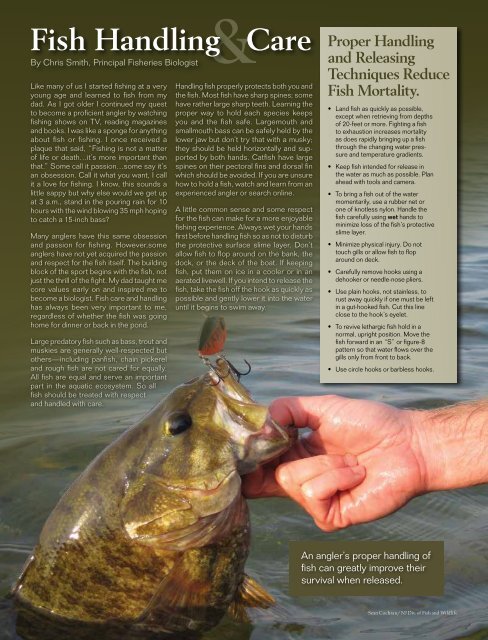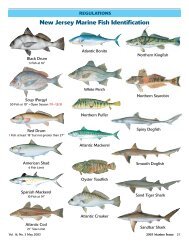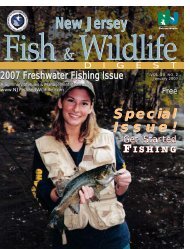Complete 2013 Freshwater Fishing DIGEST - State of New Jersey
Complete 2013 Freshwater Fishing DIGEST - State of New Jersey
Complete 2013 Freshwater Fishing DIGEST - State of New Jersey
- No tags were found...
You also want an ePaper? Increase the reach of your titles
YUMPU automatically turns print PDFs into web optimized ePapers that Google loves.
Fish Handling&CareBy Chris Smith, Principal Fisheries BiologistLike many <strong>of</strong> us I started fishing at a veryyoung age and learned to fish from mydad. As I got older I continued my questto become a pr<strong>of</strong>icient angler by watchingfishing shows on TV, reading magazinesand books. I was like a sponge for anythingabout fish or fishing. I once received aplaque that said, “<strong>Fishing</strong> is not a matter<strong>of</strong> life or death…it’s more important thanthat.” Some call it passion…some say it’san obsession. Call it what you want, I callit a love for fishing. I know, this sounds alittle sappy but why else would we get upat 3 a.m., stand in the pouring rain for 10hours with the wind blowing 35 mph hopingto catch a 15-inch bass?Many anglers have this same obsessionand passion for fishing. However,someanglers have not yet acquired the passionand respect for the fish itself. The buildingblock <strong>of</strong> the sport begins with the fish, notjust the thrill <strong>of</strong> the fight. My dad taught mecore values early on and inspired me tobecome a biologist. Fish care and handlinghas always been very important to me,regardless <strong>of</strong> whether the fish was goinghome for dinner or back in the pond.Large predatory fish such as bass, trout andmuskies are generally well-respected butothers—including panfish, chain pickereland rough fish are not cared for equally.All fish are equal and serve an importantpart in the aquatic ecosystem. So allfish should be treated with respectand handled with care.Handling fish properly protects both you andthe fish. Most fish have sharp spines; somehave rather large sharp teeth. Learning theproper way to hold each species keepsyou and the fish safe. Largemouth andsmallmouth bass can be safely held by thelower jaw but don’t try that with a musky;they should be held horizontally and supportedby both hands. Catfish have largespines on their pectoral fins and dorsal finwhich should be avoided. If you are unsurehow to hold a fish, watch and learn from anexperienced angler or search online.A little common sense and some respectfor the fish can make for a more enjoyablefishing experience. Always wet your handsfirst before handling fish so as not to disturbthe protective surface slime layer. Don’tallow fish to flop around on the bank, thedock, or the deck <strong>of</strong> the boat. If keepingfish, put them on ice in a cooler or in anaerated livewell. If you intend to release thefish, take the fish <strong>of</strong>f the hook as quickly aspossible and gently lower it into the wateruntil it begins to swim away.Proper Handlingand ReleasingTechniques ReduceFish Mortality.• Land fish as quickly as possible,except when retrieving from depths<strong>of</strong> 20-feet or more. Fighting a fishto exhaustion increases mortalityas does rapidly bringing up a fishthrough the changing water pressureand temperature gradients.• Keep fish intended for release inthe water as much as possible. Planahead with tools and camera.• To bring a fish out <strong>of</strong> the watermomentarily, use a rubber net orone <strong>of</strong> knotless nylon. Handle thefish carefully using wet hands tominimize loss <strong>of</strong> the fish’s protectiveslime layer.• Minimize physical injury. Do nottouch gills or allow fish to floparound on deck.• Carefully remove hooks using adehooker or needle-nose pliers.• Use plain hooks, not stainless, torust away quickly if one must be leftin a gut-hooked fish. Cut this lineclose to the hook’s eyelet.• To revive lethargic fish hold in anormal, upright position. Move thefish forward in an “S” or figure-8pattern so that water flows over thegills only from front to back.• Use circle hooks or barbless hooks.An angler’s proper handling <strong>of</strong>fish can greatly improve theirsurvival when released.Sean Cochran/ NJ Div. <strong>of</strong> Fish and Wildlife
















